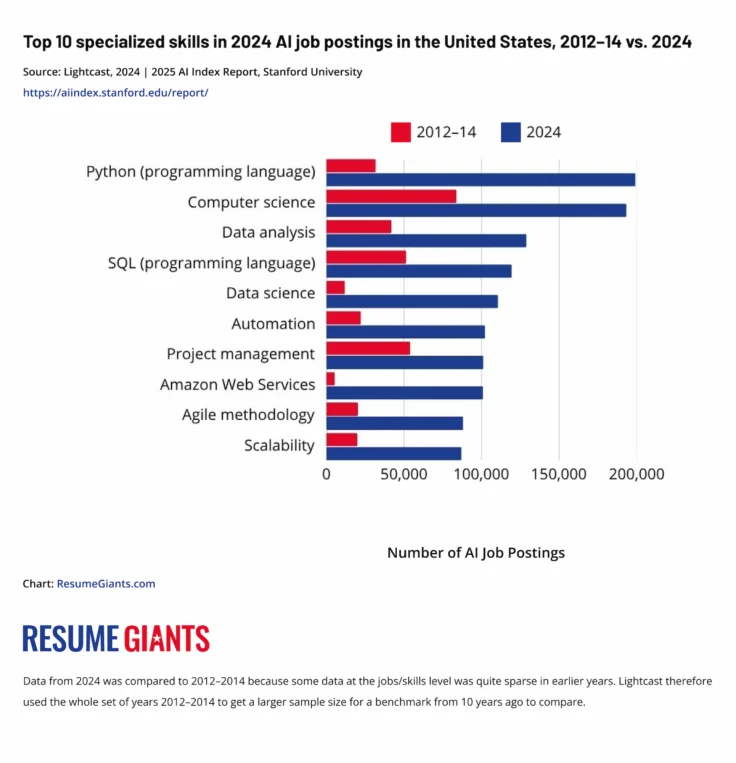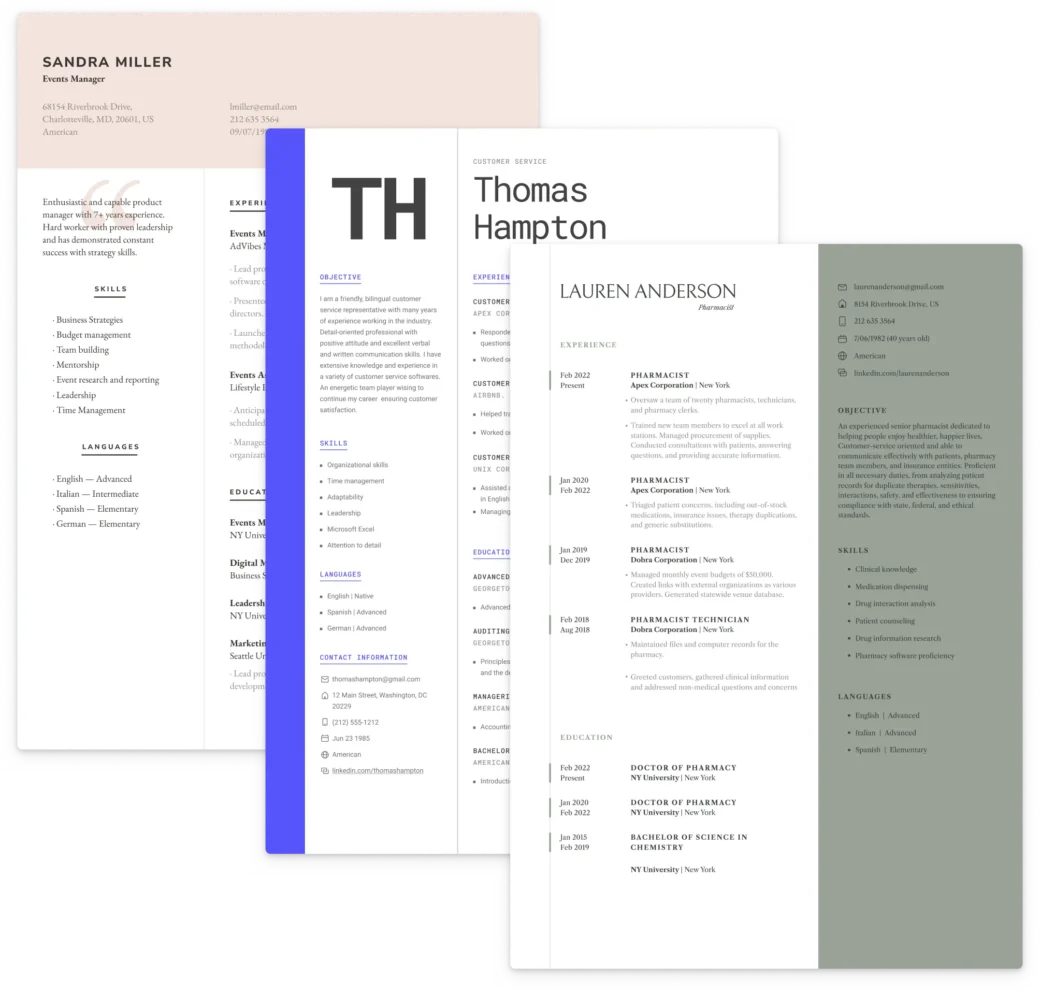Ever since the launch of ChatGPT, companies have been boarding the AI train to streamline their business processes and brainstorm stellar content. There is a lot of buzz around AI, whether it’s fear of it taking our jobs or excitement about the capabilities of new tech in areas like medicine.
But how does it relate to you and your job search? What are some of the AI skills that are in demand in 2026, and how can you reflect these in your resume?
Whether you’re just getting your foot in the door in using AI tools at work or are already an industry professional within the realm of artificial intelligence, we’ve got expert tips to help you include the necessary AI skills on your resume.
What’s more, many jobs that require such skills can often be fully remote or offer hybrid schedules, which certainly adds to their appeal in terms of flexibility!
The demand for AI skills is global. You can find opportunities here at home, but there are also job opportunities in Europe, where there are some equally exciting projects in development.
In this guide, we’ll help you break down the different ways to include industry-specific artificial intelligence skills and AI experience when writing your resume to help land your next dream job.
You can also use our AI-powered resume builder to help you build yours. Our tool can help you fill in the areas of your resume you are struggling with, making smart suggestions based on your profile and experience.
Why Are AI Skills Important?
Each time you use an automated service like Siri or Alexa, Google Maps, Translate, or Google Chat’s/Documents suggested responses—artificial intelligence is working in the background. Companies can save thousands (or even millions) of dollars if their employees are agile in their work by using AI-powered tools like these and more in the workplace.
AI skills are also increasingly crucial in today’s professional landscape due to the pervasive integration of artificial intelligence across various industries.
As businesses strive to enhance efficiency, make data-driven decisions, and stay competitive, the demand for professionals with artificial intelligence skills continues to grow.
Just take a look at the graph below, which takes data from Stanford University’s 2025 Artificial Intelligence Index Report on the top AI skills in US job postings in 2024 compared to a data range from 10 years earlier.

How AI Skills Can Be Used in the Workplace
Having skills in the technology and tools that use AI can empower individuals to harness the power of machine learning, data analysis, and automation, enabling them to extract valuable insights from large datasets, develop predictive models, and create innovative solutions.
Whether it’s working as an AI Developer, generating content, optimizing business processes, improving customer experiences, or addressing complex challenges, AI skills provide a versatile toolkit for professionals to navigate the evolving demands of the modern workplace.
In fact, according to an Amazon AWS report, 92% of the employers surveyed predicted that they would be using AI in their workplaces by 2028.
10 AI Skills That Can Shine on Your Resume in 2026
To use AI effectively and develop skills related to it, you’ll need to be adaptable, open to learning new tools, and have an interest in new technology. Since the world of tech is rapidly evolving by the day, it’s critical to stay on top of industry trends, and you’ll need to stay up-to-date with recent developments in IT skills.
We’ve rounded up 10 in-demand AI skills that recruiters are looking for right now in 2026:
- Machine Learning (ML)
- Natural Language Processing (NLP)
- Computer Vision (CV)
- Programming Languages such as Java, Python, and R
- Speech Recognition
- Data Science
- Automation
- Generative AI tools
- AI Security
- Ethical AI
How and Where to Include AI Skills in Your Resume
So, where do these skills in AI fit into your resume? To continue this guide, we’ll provide you with examples from different roles to demonstrate how you can skillfully incorporate AI-related competencies when updating your resume.
By showcasing specific AI skills and programs within the context of different industries, we’ll guide you on where and how to present these valuable skills effectively. You can also use the AI technology within our resume builder to generate personalized suggestions for your tailored resume.
💡top tip
Remember to pair your technical know-how with soft skills. How did you work with your team to take your artificial intelligence initiatives to the next level? What positive changes happened to your organization as a result?
Use AI keywords throughout your resume
Every time you prepare your resume for a role you’re targeting, you need to tailor it to the specific job offer. This demonstrates that you are paying attention to detail and have properly considered how your skills and experience match the job description.
One way to adapt your resume is by incorporating keywords from the job description into the various sections of your document. You can also research the role online and discover more useful keywords from your specific industry.
Our AI resume builder can provide useful keyword suggestions when you use it to create your resume. It also includes a free AI skills generator to help you optimize your resume for ATS.
We used the 2025 Stanford AI Index Report to generate lists of keywords for six example work sectors that can help you build a resume that makes a solid impression. You can use some of these keywords when learning to write the rest of your resume, later in the article.
Marketing, sales, and creative AI keywords
If you’re looking for a role in marketing or sales and want to show you have skills in AI, make sure you use some of the terms below if you have relevant experience or training.
- Generative AI campaigns
- Prompt engineering
- AI-driven customer segmentation
- Content generation automation
- Chatbot optimization
- AI personalization tools
- Conversational marketing AI
- Synthetic media production
Machine Learning resume keywords
Those looking for work as a Machine Learning Scientist, Analyst, or Engineer, or in areas such as Natural Language Processing, Data Science, or research, will benefit from including skills keywords like the examples below.
- Supervised learning
- Foundation models
- Reinforcement learning
- Model fine-tuning
- Computer vision
- Large language models (LLMs)
- Transfer learning
- MLOPS (machine learning operations)
Data management resume keywords
Data Scientists, Research Scientists, Robotics Engineers, and Data Engineers can benefit from including these skills keywords in their resume sections.
- Data labeling and annotation
- Model evaluation metrics
- AI benchmarking (e.g., MMLU, HellaSwag)
- Data Preprocessing pipelines
- Scalable data infrastructure
- Synthetic data generation
- Model training datasets (e.g., ImageNet, LAION)
- Data curation for AI models
Research and governance AI keywords
There is a need for AI Policy and Governance Managers, AI Governance Advisors, and Specialists across various businesses, organizations, and government bodies, as well as AI Research Scientists. These keywords in AI skills can boost your resume for these roles.
- AI ethics and safety
- Responsible AI frameworks
- AI policy analysis
- Risk assessment in AI
- Explainability and transparency
- Fairness in AI systems
- Model governance protocols
- AI regulation compliance
Software engineering and development AI keywords
If you work in software engineering or development and are looking to boost your career, these AI skills keywords can help you step up to that next role.
- AI code generation (e.g., Codex, GitHub Copilot)
- Software development with LLMs
- AI-augmented testing tools
- Continuous integration with AI
- Code review automation
- API integration with AI Models
- Version control for ML models
- AI-powered debugging tools
Automation resume keywords
With a need for specialists who can help businesses and organizations improve their efficiency, reduce costs, and enhance productivity, AI Automation Engineers and Consultants can strengthen their resumes with the following keywords.
- Robotic Process Automation (RPA)
- Intelligent workflow orchestration
- AI task scheduling
- End-to-end automation pipelines
- Natural language automation interfaces
- AI-based process optimization
- Autonomous system deployment
- AutoML (Automated Machine Learning)
Now we’ll outline how you can include these skills and keywords in each section of your resume, with a step-by-step guide.
Make your resume summary AI savvy
Integrating AI skills into your resume summary is a powerful way to immediately capture the attention of hiring managers. Craft a succinct and impactful opening summary that highlights your proficiency in AI technologies relevant to your field.
Clearly state the value you bring through your AI expertise, the tools you use, and any achievement linked to using AI in the workplace. This sets a strong foundation for the rest of your resume, demonstrating your commitment to staying at the forefront of technological advancements.
Let’s see an example resume summary for a Data Analyst that demonstrates artificial intelligence experience and skills:
Data Analyst
Dedicated Data Analyst with 6+ years of experience extracting actionable insights from complex datasets. Proficient in utilizing advanced statistical models and machine learning algorithms to drive data-driven decision-making. Skilled in Python and R for data manipulation and analysis, with hands-on experience in implementing predictive modeling and clustering techniques.
Highlight your AI abilities in your skills section
Now, how do you choose the right AI skills for the resume skills section? Create a dedicated section near the top of your resume, under your summary, labeled “Skills” or “Technical Proficiency.”
As of 2023, skills-based hiring is on the rise, so we recommend listing yours in this eye-catching spot near the top of your resume.
Next, you should list the AI-related skills specific to your role, such as machine learning frameworks (TensorFlow, PyTorch), programming languages (Python, R), and any AI tools you’re proficient in.
Here is an example of how someone working in web development might list their technical AI skills.
AI Skills
Programming: C++ | Python | R | Julia
Machine Learning: Google Cloud AutoML | PyTorch | Apache Mahout
You can also integrate AI skills that specify how you’ve used AI tools for data analysis, customer segmentation, or personalization in digital marketing campaigns. On the other hand, you might have used AI tools for content creation, such as natural language processing (NLP) tools, generative AI, or AI-driven content optimization tools.
These might include ChatGPT, Google Bard, Grammarly, or Hemingway. Make sure you include these in your resume.
Now let’s take a look at some examples of AI skills for a digital marketer’s resume.
AI Skills
Marketing Automation: Hubspot | Marketo | Pardot
Email Marketing Optimization: Phrasee | Persado | Boomtrain
Content Creation: ChatGPT | Grammarly
Including AI in your work experience section
Effectively listing AI experience and the skills you used within it can significantly enhance your resume and demonstrate your practical application of these skills in real-world scenarios.
- Clearly state the artificial intelligence skills you possess and avoid using generic terms.
- Start each bullet point with strong action verbs to convey a sense of achievement and responsibility. For example, “Implemented,” “Developed,” or “Optimized.”
- Specify the tools, languages, frameworks, and methodologies you have hands-on experience with.
- Describe AI-related projects you have worked on in your previous roles.
- Provide details from your relevant work experience on the problems you solved, the techniques applied, and the impact on the business or project with metrics.
- Include even basic gen AI resume-worthy experience, such as planning content with ChatGPT.
Experience
AI Development Specialist
Acme Corporation, San Francisco, CA
2021 – Present
- Developed and implemented machine learning algorithms for natural language processing, image recognition, and predictive analytics.
- Led a team of engineers in the design and deployment of a new AI platform for customer service automation using Python.
- Collaborated with cross-functional teams to integrate AI solutions into existing business processes reducing costs by 18%.
- Successfully reduced customer service response time by 30% through the implementation of AI-powered chatbots.
💡top tip
Whenever possible, quantify the impact of your AI contributions. For example, mention how your machine learning model improved accuracy by a certain percentage or reduced processing time.
If applicable, showcase your involvement in the entire AI development lifecycle—from data collection to analysis and the implementation of your findings. Highlight teamwork and collaboration by mentioning any cross-functional projects where you worked with other professionals to implement AI solutions.
For example, if you work in digital marketing, highlight any notable achievements related to AI in your campaigns. Make sure you showcase improvements in key performance indicators (KPIs) resulting from the strategic application of AI.
Focus on the outcomes of your work associated with AI. Discuss how your contributions positively impacted business operations, user experiences, or overall efficiency.
Add your AI certifications and training
If you’ve pursued ongoing education or training in AI, mention any relevant workshops, courses, or certifications to showcase your commitment to staying updated. Certifications in machine learning or AI from reputable institutions can really bolster your credibility and help compensate if you lack hands-on work experience.
When listing AI certifications and training on your resume, it’s important to present the information clearly and concisely, like this:
- Create a dedicated section and title it “Certifications” or “Professional Development.”
- Include the certification or training name and mention the full name of the certification or training program.
- Specify the issuing institution and then indicate the organization that issued the certification or provided the training.
- Include the date of completion and mention the month and year when you completed or received the certification or training.
- For bonus points, add a Relevance or Special Achievements section.
Certifications
- AWS Certified Machine Learning – Specialty, 2023
- Microsoft Certified: Azure AI Engineer Associate, 2022
Include AI skills when outlining your education
Emphasize AI-related skills you’ve gained during your academic pursuits. If you’ve taken AI-related courses during your education, include them in a “Relevant Coursework” section. This section can be especially important if you are looking for your first remote job and are lacking work experience on your resume.
Mention any capstone projects or research related to AI. Don’t forget to highlight any awards, honors, or recognition related to your AI skills when applying for graduate jobs.
Education
Bachelor of Science in Computer Science
Minnesota University
2016
- Coursework: Artificial Intelligence and Machine Learning:
- Conducted in-depth research on the application of machine learning algorithms in predicting stock prices, resulting in a published paper in the university journal.
- Awarded the “Best Research Project” for developing a sentiment analysis model using natural language processing techniques.
Including relevant coursework, research, and an award like this not only highlights the academic achievements but also emphasizes hands-on experience, research contributions, and awards related to AI.
It provides a well-rounded view of the candidate’s expertise in artificial intelligence within the context of their computer science education.
Artificial Intelligence projects
Listing AI projects on your resume is a great way to showcase your practical skills and experience. Here’s what we suggest as a format for AI projects:
- Clearly state the title of the AI project.
- Briefly describe the goal or problem the project aimed to address.
- Specify your role in the project, such as developer, data scientist, machine learning engineer, etc.
- Mention the specific AI tools, programming languages, and technologies you utilized during the project (e.g., Python, TensorFlow, PyTorch, Scikit-Learn).
- Summarize the outcomes of the project, such as improvements achieved, accuracy rates, or any other relevant metrics.
Here are two examples of how you can include an AI project on a resume:
Projects
AI-Powered Chatbot Development:
- Developed a chatbot in C++ using natural language processing and machine learning algorithms to provide personalized responses to user queries.
- Implemented sentiment analysis to enhance the chatbot’s understanding of user emotions.
Predictive Analytics for E-commerce:
- Engineered a predictive analytics model for an e-commerce platform in Python, forecasting customer preferences and improving inventory management.
- Project awarded “Best Data Science Project” at the university’s IT Expo
Tailor the details based on the specifics of your projects and ensure that they are outlined in a clear way that can be understood by HR professionals as well as tech experts.
Also, make sure to quantify the project outcome whenever possible to provide the tangible impact that your work had.
Closing Thoughts on AI Skills Inclusion on a Resume
In today’s job market, putting AI skills on your resume isn’t just a smart move; it’s practically a must. Companies all around are using AI tech more and more, so showing you’ve got a handle on it can make you stand out.
When you list skills like knowing how to use machine learning, analyze data, and solve problems with AI, you’re not just saying you’re up-to-date; you’re saying you’re ready to tackle challenges with the latest tech tools.
However, it’s more than just about looking good on paper. Including AI skills in your job applications makes you more competitive. Employers know how much AI can help make things run smoother and spark new ideas.
As industries continue to evolve, individuals with artificial intelligence skills are better positioned to lead, innovate, and drive positive change, making these skills a valuable asset for career growth and long-term success in the dynamic landscape of the 21st century.
Head on over to our templates or free resume builder to help you update yours with these tips.

Build your perfect resume with ease
Craft the perfect resume effortlessly with our builder. Get started today!
Related Posts

